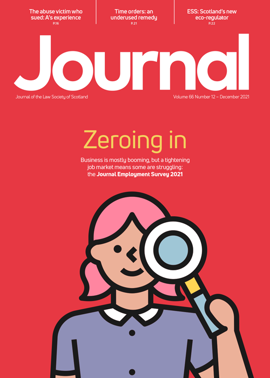In the victim's shoes

It is unusual for the Journal to be approached by a party to a litigation, seeking to inform the legal profession about their experience. All the more so when that party is concerned to preserve their anonymity. That is what happened after judgment was issued on 13 October in A v Glasgow City Council [2021] CSOH 102.
After a proof on quantum, Lord Brailsford awarded A a total of £1,339,185 for sexual abuse sustained between ages 12 and 17 at the hands of a foster parent, WQ, with whom he had been placed by the council. The abuse dated from the 1980s and has had a severe and continuing impact on A’s life ever since. In 2019, WQ was sentenced to 10 years in prison for crimes against A.
A wanted to talk about his experience, as this is the first case of its kind in Scotland to have resulted in an award at this level, and because “the whole process of dealing with these cases is still very embryonic and there is quite a bit of early learning that can be done, so I felt I had a bit of a responsibility to partake in that conversation and it wouldn’t get lost – with the Journal it’s going directly to the right audience”.
A is an articulate individual who explains with clarity how the legal process affects pursuers like himself, and where he thinks it can improve. His comments should also give defender organisations – and their insurers – cause to consider the correct approach and attitude when faced with such claims.
Limiting liability?
Victims of ill-treatment often say that the first thing they want is some acknowledgement and expression of regret by the wrongdoer for the hurt caused – in short, some emotional understanding. For A, the way the council chose to respond, despite accepting vicarious liability, “galvanised” him to see the case through to a judicial award rather than settle.
Although it is now known that concerns had been raised about WQ’s suitability ahead of A’s placement, and social workers failed to act when A first complained about what was happening, A has yet to hear any expression of regret from the council. He places much weight on John Swinney’s statement last year, when piloting the bill to introduce the redress scheme for abuse survivors, that organisations and institutions which were responsible for the harm caused should now be responsible for putting those wrongs right. “I don’t think he just meant paying money and accepting liability,” A asserts. The council’s response, however, was simply to hand everything to its insurers, “and the way they’ve dealt with this, the whole way through, is about limiting liability”. A strategy that appears to have backfired, as only a low offer was on the table until just before the proof, and by the time it was improved, A was “100% determined I was going to see it through even if I ended up possibly with less”. He was awarded substantially more.
“I believed in the abilities of my legal team and in the robustness of the legal system. I thought the result would definitely be better, and I would rather get to that point and get less than be bullied by Glasgow City Council or their insurers, because that’s what I see them as doing.”
Even once the award was made, the council – which has since begun an appeal – confined its press comment to saying it would take the appropriate time to consider the judgment. “There is no acknowledgment there of the victim; there is no acknowledgment of how they dealt with me during this process; and what that does is it galvanises me. I’m absolute that the only redress I’m going to get in this situation is pounds, and therefore I will make sure I take it right to the end point.”
Trials of civil procedure
Turning to the court process itself, A reveals that contrary to what many (his own advisers included) might expect, he found the civil process more difficult than the criminal.
“It look a long time to get to the criminal trial, but when we got there, two things helped. First, Victim Support are very good at their job: they take you there, show you the courtroom, tell you what’s there, they’re with you on the day, they look after your needs. Also the prosecutor was a perfect gentleman: he was very clear and precise about what he needed from me, and he was very understanding of vulnerability, so although, on the day, it was harrowing to go back and be in the same room as the perpetrator and go through that process, it was also a relief. It was the end result after 31 years.”
With the five year civil case, despite praising the support from his legal team (Thompsons’ Laura Connor, who instructed Robert Milligan QC and Jan McCall), “I found the process quite linear: civil lawyers don’t tend to do anything with B until A is ticked off, and the same with C and D. Where I come from, a project management environment, I’m thinking that while I’m waiting for A to be done, I can be doing B and getting a bit of D done, in preparation for C.”
In addition, there was an awful lot of repetition. “You were going through things, not once or twice but five, six, seven times with your side’s psychologists, psychiatrists, your own legal team, the career specialists, this person and that, and then you have to do all the same on the other side.” A believes the system should require joint expert witness assessments: “They should make it that one set of professionals does this, because we’re retraumatising the person every time we do it.”
He strongly supports the enabling potential of suing “no win, no fee”, however; and he does have a good word for the judge, Lord Brailsford, who with the benefit (A believes) of experience as the family judge, “set the tone” for the proof and kept matters focused on the issues still in dispute. Even so, there was a six-and-a-half month wait for the judgment, also testing for A. “So if you were to say to me which is easier, I would say the criminal side, to be honest. The civil side is so long and so drawn out, it’s like stretchy elastic.”
Frustrations at the slow progress could threaten to boil over in dealings with his advisers. He credits Laura Connor’s handling of these. “I also had my own psychotherapist, and it’s very much something you need while you’re going through the process because it’s just something that has no light at the end of the tunnel – you don’t know how long the tunnel is.”
In addition, A would have liked someone to have been available, “particularly on the day before and the day of the proof. Someone I could phone and say, I’m not feeling great about this, I’m feeling quite scared and upset, quite emotional, and everything depends on my evidence. Not my solicitor – I would want her to be focused on my case. I have since told Thompsons I would have been happy to pay part of my award when it came in, if that kind of support had been there”.
Valuable insight
Legal representatives, and judges, may feel they lack the training to deal with cases like A’s. A recommends one book to them for insight: The Body Keeps the Score, by Bessel van der Kolk, a leading psychiatrist, on trauma and early trauma and the effects it has on a person’s ability to function. “I think that every lawyer and every judge dealing with these cases, and even rape victims or anyone who has been through trauma and is suing on that basis, all of them should read that book.” No other book he has read, or psychologist or psychiatrist he has consulted, has “articulated the effects of trauma on my physicality, my wellbeing, my emotions and my ability to function as well as this book”.
He adds: “My little legacy is that when we finally get this case over the line, I am going to offer up this book: I will pay for a copy for anybody in the legal service in Scotland that wants to get involved in these cases.”
Other legal avenues?
A’s award is far more than he could have obtained under the Scottish Government’s redress scheme, which will offer a maximum £100,000. How does he view the scheme? A is disappointed that the Government decided to introduce a waiver of the right to sue as a condition of a scheme award.
“I would never have considered it because touch wood, I’m only 50, I’m healthy and I’m in a position where I can keep going. I think the redress scheme works if you don’t have the evidence, if you are very old, or you are sick, or you just emotionally could not go through it. But the maximum payment isn’t even what I’ve been awarded just for solatium [£135,000].
“I don’t think it should have had the waiver. Even if it had been like the Criminal Injuries Compensation Scheme, which I had done previously, that didn’t stop me from litigating, it just means I pay that back. The redress scheme could have done that, I think.”
Top of the list of his desired changes in the law, however, is to make it an offence for someone who knows that abuse is taking place – in his case, WQ’s wife – to fail to report it. Having approached Scottish ministers on this, he does not accept their position that it would stop people reporting it (“It would more encourage them”), or that it could come within aiding and abetting.
A concludes by returning to the position of the council and its insurers. Only “big numbers”, he believes, will make them change the way they respond to claimants – and awards in England are now rising through the millions. “I think it will only happen if they put two and two together and see that if they respond more appropriately, the victim will be less likely to stick to their ground and go after them. But in my case, I’m not interested now, I’m just interested in getting it over the line, getting payment and moving on with my life.”
Regulars
Perspectives
Features
Briefings
- Criminal court: OLRS – life means life
- Corporate: Will a deal impact on national security?
- Intellectual property: IP and AI – the latest
- Agriculture: Securing successor crofting tenant status
- Succession: Back of an envelope – testamentary intent?
- Scottish Solicitors' Discipline Tribunal
- Data protection: Google off the hook
- Property: Beautifully presented tedium
- In-house: Lawyers in uniform
In practice
- Your Law Society of Scotland Council members
- Legal services regulation reform – have your say
- The Word of Gold: Whither goest thou?
- Coaching: help in a fast changing world
- The earlier the better
- Family mediation accreditation: a view from the panel
- The Eternal Optimist: Just to say thanks…
- Appreciation: Albert Vincent Sheehan
- Ask Ash: A broken work circle






